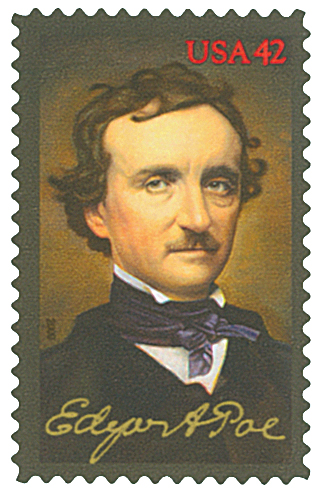
# UX286 FDC - 1997 20c Classic Movie Monsters Postal Cards - Dracula
First Publication of Dracula

On May 26, 1897, Bram Stoker’s Dracula was first published in London, England. It went on to become one of the most famous pieces of English literature and has been adapted for film more than 30 times.

Abraham “Bram” Stoker was born on November 8, 1847, in Dublin, Ireland. He suffered an unknown illness as a child, but fully recovered by the time he entered school at the age of seven. He went on to become a star athlete, playing rugby for Dublin University. After school, he got a job in the Irish Civil Service, where he remained for the next decade.

Stoker became interested in theater while still in school and got a job as a theater critic for the Dublin Evening Mail while working in the Civil Service. His drama reviews led to a friendship with actor Sir Henry Irving, who invited him to serve as the acting manager and later business manager of the Lyceum Theatre. With Irving, Stoker traveled the world, including two visits to the White House and a meeting with one of his literary heroes, Walt Whitman.

Stoker produced short horror stories for magazines over the years and published his first novel, The Snake’s Pass, in 1890. He likely started his extensive research for his most famous novel that year. Stoker put together more than 100 pages of notes, exploring Transylvanian folklore and history. It’s been suggested the title character Dracula was based on historical figures such as Wallachian prince Vlad the Impaler or countess Elizabeth Báthory, but neither figure is mentioned in his notes. He chose the name “Dracula” from a book, because he thought it meant “devil” in Romanian.

Stoker didn’t invent the idea of vampires. Stories about undead figures drinking blood had been popular in folk takes dating back to ancient times. But Stoker’s novel would bring vampires into the forefront of mainstream literature. Dracula was first published in London on May 26, 1897. It received positive reviews for its effective use of horror, though some critics said was too frightening. The story follows the title character, Dracula, as he travels from Transylvania to Yorkshire, England. It’s presented as an epistolary novel, presented as a series of documents – letters, diary entries, and newspaper articles – written by its main characters.

Dracula was serialized in US newspapers and then published in the US in 1899. Though it was a moderate success during his lifetime, Stoker didn’t make a fortune from the book’s sales. As it turned out, he hadn’t fully followed US copyright law, which required him to purchase the copyright and register two copies. He only registered one, making the novel part of the public domain.

Stoker wrote the first theatrical adaptation of Dracula, which was performed only once in 1897. It was first made into a film in 1921, but it was Béla Lugosi’s portrayal in 1931 that cemented Dracula in popular culture. In all, Dracula has been adapted for film more than 30 times. Taking into account film, televisions, video games, comic books, animation, and stage performances, Dracula has seen over 1,000 adaptations over the years. The novel is considered one of the most famous pieces of English literature and a classic in the Gothic and horror genres.
First Publication of Dracula

On May 26, 1897, Bram Stoker’s Dracula was first published in London, England. It went on to become one of the most famous pieces of English literature and has been adapted for film more than 30 times.

Abraham “Bram” Stoker was born on November 8, 1847, in Dublin, Ireland. He suffered an unknown illness as a child, but fully recovered by the time he entered school at the age of seven. He went on to become a star athlete, playing rugby for Dublin University. After school, he got a job in the Irish Civil Service, where he remained for the next decade.

Stoker became interested in theater while still in school and got a job as a theater critic for the Dublin Evening Mail while working in the Civil Service. His drama reviews led to a friendship with actor Sir Henry Irving, who invited him to serve as the acting manager and later business manager of the Lyceum Theatre. With Irving, Stoker traveled the world, including two visits to the White House and a meeting with one of his literary heroes, Walt Whitman.

Stoker produced short horror stories for magazines over the years and published his first novel, The Snake’s Pass, in 1890. He likely started his extensive research for his most famous novel that year. Stoker put together more than 100 pages of notes, exploring Transylvanian folklore and history. It’s been suggested the title character Dracula was based on historical figures such as Wallachian prince Vlad the Impaler or countess Elizabeth Báthory, but neither figure is mentioned in his notes. He chose the name “Dracula” from a book, because he thought it meant “devil” in Romanian.

Stoker didn’t invent the idea of vampires. Stories about undead figures drinking blood had been popular in folk takes dating back to ancient times. But Stoker’s novel would bring vampires into the forefront of mainstream literature. Dracula was first published in London on May 26, 1897. It received positive reviews for its effective use of horror, though some critics said was too frightening. The story follows the title character, Dracula, as he travels from Transylvania to Yorkshire, England. It’s presented as an epistolary novel, presented as a series of documents – letters, diary entries, and newspaper articles – written by its main characters.

Dracula was serialized in US newspapers and then published in the US in 1899. Though it was a moderate success during his lifetime, Stoker didn’t make a fortune from the book’s sales. As it turned out, he hadn’t fully followed US copyright law, which required him to purchase the copyright and register two copies. He only registered one, making the novel part of the public domain.

Stoker wrote the first theatrical adaptation of Dracula, which was performed only once in 1897. It was first made into a film in 1921, but it was Béla Lugosi’s portrayal in 1931 that cemented Dracula in popular culture. In all, Dracula has been adapted for film more than 30 times. Taking into account film, televisions, video games, comic books, animation, and stage performances, Dracula has seen over 1,000 adaptations over the years. The novel is considered one of the most famous pieces of English literature and a classic in the Gothic and horror genres.











